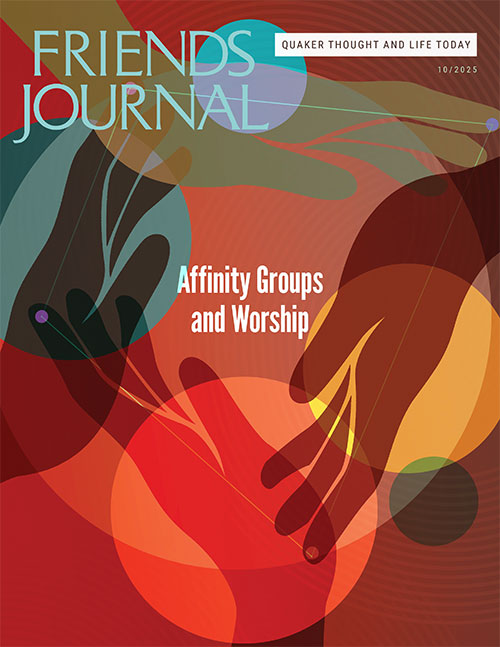Looking back at Quakers and MOVE
The August Friends Journal article on MOVE and Quakers is distorted in important ways (“Quaker Witnessing During Philadelphia’s MOVE Crisis” by Natalie Fraser and Chioma Ibida, FJ Aug.). As the photograph shows, I was there in their early Powelton Village neighborhood crisis in MOVE’s early days in the 1960s. Soon I created a personal channel of ongoing communication with two MOVE members when they came to Haverford College to disrupt an evening lecture I was giving. They failed, and I got to know them.
I maintained communication with the pair, from the early Powelton days to the later Osage Avenue crisis period when I called a number of community leaders, including Philadelphia’s most prominent Black clergyman, Paul Washington, to my home to develop a peace intervention plan. That meeting was invaded at midpoint and tragically disrupted by the two MOVE members I’d stayed in touch with!
The article states that “Every aspect of the conflict between MOVE and the City of Philadelphia was embedded in racism.” Of course racism played a role, but the article ignores what actually made MOVE so controversial in the racially integrated community of Powelton: MOVE members’ behavior daily disrupted the everyday lives of other Powelton residents.
If racism had been the primary problem, then MOVE’s shifting to the Black neighborhood of Osage Avenue should have been the solution. Instead, MOVE’s neighborhood-wrecking behavior escalated, in the Black community! There, MOVE put loudspeakers on the roof of its house so that members could play raucous music and scream profanity day and night! It so destroyed the peace of the Black people of Osage that I was not alone in worrying that Black neighbors with guns would take matters into their own hands.
That fear added to the pressure on the city’s Black mayor, who felt forced to impose a military solution, whose tragic outcome still haunts us.
Friends did not simplify MOVE and the police as two parties in disagreement, as the article asserts. The fundamental conflict was between MOVE and its neighbors. Initially, there were some Philadelphians who were sympathetic with some of MOVE’s themes, but I never met anyone—Black or white—who would have been willing to move their families near them!
Contrary to the article’s assertion, the primary difficulty in trying to be an ally to MOVE, in my experience at the time, was not on the level of values, including antiracism. An ally needed to be willing to be screamed at and abused while no actual work for change was undertaken by MOVE! (As a movement veteran, I’ve been in plenty of moments when comrades challenge each other on racism and other grounds. I know the difference between challenge—and abuse.)
Fortunately, there are many ways Friends can contribute to antiracist efforts that have clear goals and effective strategies. MOVE was, and last I heard remains, completely uninterested in either of those. Let’s take that into account.
George Lakey
Philadelphia, Pa.
The scabs of war
As a psychologist at a Veterans Administration medical center, I heard many stories that changed me from a theoretical pacifist to a flesh-and-blood hurting pacifist (“Recovering from the Shame of Combat” by Edward W. Wood Jr., FJ Sept.). A quarter century after retiring, I thought I had healed, but I’d only forgotten. This article knocked the scab off.
Sometimes when a patient would tell me how war had changed them, I’d encourage them to tell others—the home front—what it was like. They’d usually say, “You wouldn’t understand if you weren’t there.” I know that is true; there’s a difference between hearing about it and living it. But if more of us heard about it from those who lived it, would we allow our president to send people into battle? We’ve just sent the U.S. Navy to blow up boats in the Caribbean; the service members who pulled the trigger can reason with themselves that they had to do it because they had taken an oath to obey orders, but in their dreams, and in the years after they leave the service, the memory of what they did may come back to haunt them. I know, because I had the privilege of listening to similar stories.
Margaret Katranides
St. Louis, Mo.
This is really an extremely important and profound issue. I’m not sure I have the right to comment on it. I dare only remark that shame is perhaps one of the most human feelings, and morality and ethics are what sets a human apart most from other beings. War, in addition to the monstrously immoral obvious things, is also a triumph of a lie—a colossal and absolutely shameless one. And that’s why I greatly respect Wood, a strong-minded and brave man, for his truthful narratives about the war and his selfless service in the name of peace.
Gene T.
Thanks to Edward W. Wood Jr., for his powerful rendering of his personal journey of living with the shame of war. It is a story I’ve never heard before. It has profoundly moved me. I’m so sorry for the 40 years that shame held sway over him. And I am so grateful that he finally faced it head on and reaped healing and release.
Raymond Elberson
Medford, N.J.




Comments on Friendsjournal.org may be used in the Forum of the print magazine and may be edited for length and clarity.